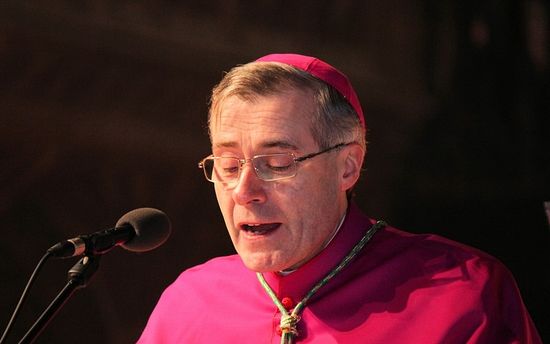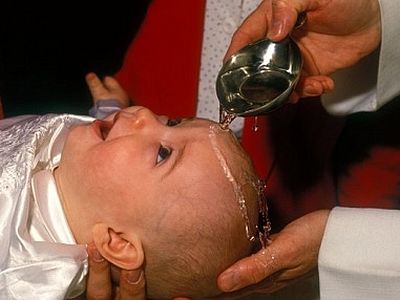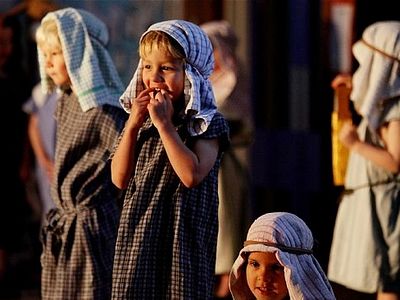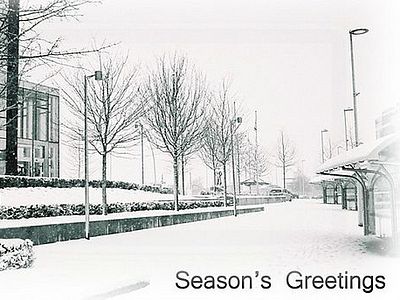Source: Catholic Herald
Bishop Davies says society must not attempt to achieve 'cohesion' by purging references to Christianity.
 Bishop Mark Davies will urge the faithful to remember the true meaning of Christmas (Simon Caldwell)
Bishop Mark Davies will urge the faithful to remember the true meaning of Christmas (Simon Caldwell)
The Bishop of Shrewsbury has described the John Lennon song Imagine as “heart-chilling” in a Christmas homily.
Reflecting on this year’s Christmas adverts which focus on the First World War, Bishop Mark Davies will say in a homily on Christmas Day: “The events of Christmas 1914 give the lie to the lazily repeated assertion that ‘religion is the cause of wars’. John Lennon would give voice to this ill-founded belief in the lyrics of his song Imagine. This becomes a heart-chilling vision in which Lennon imagines a world with no hope of heaven and no fear of hell. And he adds, ‘no religion too’. Only then, he suggests will ‘all the people’ be ‘living life in peace.’”
The bishop will continue: “Yet the fact is, the wars of the century past, bringing with them atrocities and destruction on a scale never seen before, were largely inspired by secularist and, indeed, openly anti-Christian ideologies. In reality, it is human sin which lies at the root cause of war. Conflicts, writes St James, arise within the human heart wherever ‘bitter jealousy and selfish ambition’ are found (James 3: 14). Tonight we declare that Christ came to ‘save us from our sins’, to enable us to give glory to God and to bring peace amongst men. Christ calls all who would follow Him to have, as we have just heard in St Paul’s words: ‘no ambition except to do good’ (Titus 2:14).”
Bishop Davies will urge his flock to remember the true meaning of Christmas, and not to attempt to achieve “social cohesion” by purging references to Christianity.
Pointing out that in the UK two out of three schools substitute a Nativity Play for ‘Winter celebrations’, he will say: “Civil servants, it is reported, are advised not to use the word ‘Christmas’ to avoid giving offence; and most civic authorities limit themselves to voicing merely ‘Seasonal Greetings’. How much we need to be reminded on this Christmas Night 2014, that the greatest message for peace and the cohesion of society is being lost amongst us! Charles Dickens captured this message in his Christmas Carol by tracing the path of Scrooge’s conversion. ‘Christmas,’ Scrooge’s nephew tells him ‘… apart from the veneration due to its sacred name and origin, if anything belonging to it can be apart from that … is the only time I know of, in the long calendar year, when men and women seem by one consent to open their shut-up hearts freely…’
“If the light and meaning of Christmas were to be lost amongst us, then what would call new generations to so open their hearts? What would call them beyond divisions to recognise each other as sisters and brothers, each with an eternal value and dignity? This was ‘the news of great joy’ meant for all people which was first heard in the hills of Bethlehem 2,000 years ago and even echoed amid the trenches of the Great War. It is the joy welcomed anew in our hearts this night: ‘a saviour has been born to you; he is Christ the Lord’ (Lk 2: 11).”
Bishop Mark Davies will celebrate Midnight Mass at Shrewsbury Cathedral.
Full text of Bishop Davies’ pastoral letter:
In the darkness of this night Christians gather across the world to welcome “news of great joy” of the Child born for us (Is 9:6), the Saviour given to us, who is Christ the Lord (Lk. 2:10). And on this night, we cannot fail to recall how exactly one hundred years ago soldiers emerged from the trenches of the Western Front to sing of Christ’s Birth; to join hands in friendship; to exchange gifts and even to play improvised games of football. The Christmas truce of 1914 is universally recognised as a brief moment of humanity amidst the death and destruction of the Great War. The then Pope, Benedict XV, in his tireless efforts to bring an end to the carnage had repeatedly called for this cessation of hostilities. The Pope’s appeal was unheeded by governments, yet spontaneously taken up by ordinary soldiers on both sides of the trenches.
The media and even a supermarket advert have recounted what happened that Christmas night of 1914 but we must also ask: Why did this happen? What could inspire these men to see beyond their bitter divisions; the demonization of the enemy; the animosity born of the passions of war to see each other as brothers? What could have drawn enemies from their entrenched positions to greet each other as friends? A Bank Holiday? A winter celebration? No, it was surely the light which first shone with the birth of a child born in Bethlehem, a Saviour given to all humanity who turns our minds to thoughts of peace.
The events of Christmas 1914 give the lie to the lazily repeated assertion that “religion is the cause of wars.” John Lennon would give voice to this ill-founded belief in the lyrics of his song “Imagine.” This becomes a heart-chilling vision in which Lennon imagines a world with no hope of heaven and no fear of hell. And he adds, “no religion too.” Only then, he suggests will “all the people” be “living life in peace.” Yet the fact is, the wars of the century past, bringing with them atrocities and destruction on a scale never seen before, were largely inspired by secularist and, indeed, openly anti-Christian ideologies. In reality, it is human sin which lies at the root cause of war. Conflicts, writes St. James, arise within the human heart wherever “bitter jealousy and selfish ambition” are found (James 3: 14). Tonight we declare that Christ came to “save us from our sins,” to enable us to give glory to God and to bring peace amongst men. Christ calls all who would follow Him to have, as we have just heard in St. Paul’s words: “no ambition except to do good” (Titus 2:14).
In Britain today we are told two thirds of schools now substitute a “winter celebration” for the Nativity Story; civil servants, it is reported, are advised not to use the word “Christmas” to avoid giving offence; and most civic authorities limit themselves to voicing merely “Seasonal Greetings.” How much we need to be reminded on this Christmas Night 2014, that the greatest message for peace and the cohesion of society is being lost amongst us! Charles Dickens captured this message in his “Christmas Carol” by tracing the path of Scrooge’s conversion. “Christmas,” Scrooge’s nephew tells him “… apart from the veneration due to its sacred name and origin, if anything belonging to it can be apart from that … is the only time I know of, in the long calendar year, when men and women seem by one consent to open their shut-up hearts freely …” If the light and meaning of Christmas were to be lost amongst us, then what would call new generations to so open their hearts? What would call them beyond divisions to recognise each other as sisters and brothers, each with an eternal value and dignity? This was “the news of great joy” meant for all people which was first heard in the hills of Bethlehem 2,000 years ago and even echoed amid the trenches of the Great War. It is the joy welcomed anew in our hearts this night: “a saviour has been born to you; he is Christ the Lord” (Lk 2: 11).



